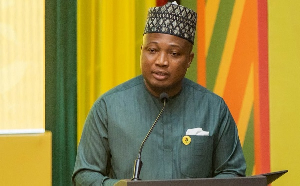Accra, Aug. 8, GNA - The Resident Manager of Caisse Francaise de Developpement, the French development agency, on Monday submitted seven out of the nine documents requested by the Former Chief Executive of the Ghana National Petroleum Corporation (GNPC), who is standing trial for causing financial loss to the State, to help him in his defence. The Manager, Mr Jean Francois Arnal told the Accra Fast Track High Court that the remaining two documents had been destroyed.
The Defence team at the last sitting stated that their client needed certain vital documents to enable him to go through the sequence of what had transpired and, therefore, asked the Court to issue summons. According to Counsel, he applied to Caisse Francaise de Developpement to furnish him with certain documents to assist him in his trial, but the Company replied that it could only make available such documents through an order by the Court, within the framework of justice.
Tsatsu is also charged with four counts of causing financial loss and intentionally misapplying funds totalling 2.345 billion cedis to the State through a loan he guaranteed on behalf of GNPC for Valley Farms Company, a private cocoa buying company.
The Company contracted the loan from Caisse Francaise de Developpement in 1991 but defaulted in the payment. GNPC, which acted as the guarantor, therefore, paid it in 1996.
The offence, according to the Prosecution, was contrary to Section 1(2) of the Public Property Protection Decree 1977 (SMCD140). Tsatsu has pleaded not guilty to the charges and the Court has granted him a 700 million-cedi self-recognisance bail.
After Mr Arnal had sworn on the Bible to hand over the documents, he explained to the Court that with regard to the two remaining documents, it was his Agency's policy not to keep documents, basically correspondence, beyond 10 years and that such documents were normally destroyed.
He said he was at the Court to submit the documents that the Court had compelled him to.
At this juncture, there was a brief argument over the issue of who should take over the documents.
Prof Emmanuel Victor Oware Dankwa, Leading Counsel for the Tsatsu, said the documents should be submitted to the Court and stressed that by virtue of Mr Arnal's submission of the document, he was a witness in the case.
He said it was proper for Mr Arnal to have tendered the documents, instead of submitting them. "By this way, the witness (Mr Arnal) could be cross-examined."
Mr Osafo Sampong, Director of Public Prosecution (DPP), stated that Counsel's application was that the documents should be brought to Court to help the accused person to conduct his defence. Mr Sampong disagreed with Prof. Dankwa that Mr Arnal was summoned to appear before the Court as a witness in the case.
The trial judge, Mrs Justice Henrietta Abban, Appeal Court Judge, sitting on the case as a High Court Judge, said she summoned the Resident Manager to send the documents to Court. She questioned the basis for which Counsel wanted the Resident Manager to tender the documents.
Mrs Justice Abban explained: "Tsatsu wrote to the Agency, but it refused. Now it has been compelled to bring them so the documents have to be handed over to you."
She said she expected that Mr Arnal would put together all the seven documents, and hand them over to Tsatsu, so that when he was needed at the appropriate time, Counsel would call him for clarification.
"I don't know how you are conducting your evidence." The Court then took a brief break and the Judge; Prosecution and Defence teams went into chambers.
When the Court resumed, Prof. Dankwa asked the Court for time to enable him to study the documents for continuation of proceedings and the DPP obliged. The Resident Manager indicated he was to travel outside the country on Monday night.
The case was, therefore, adjourned at the instance of Counsel, to August 18.
In March 2003, the FTC overruled the submission of no case filed by Tsatsu and ordered that he should open his defence in the case. Tsatsu then filed an appeal at the Appeals Court in November 2004, which was dismissed on the grounds that it lacked merit and, therefore, ordered him to go back to the FTC to open his defence.
He filed an appeal to challenge the Appeals Court's ruling at the Supreme Court and this was also overruled.
The accused then proceeded to the Supreme Court for a review, but it again asked him to go and open his defence.
General News of Monday, 8 August 2005
Source: GNA












